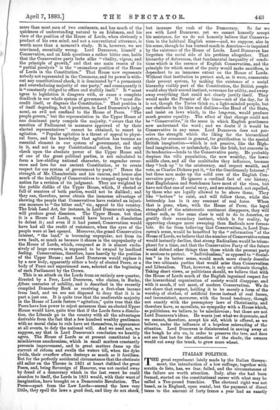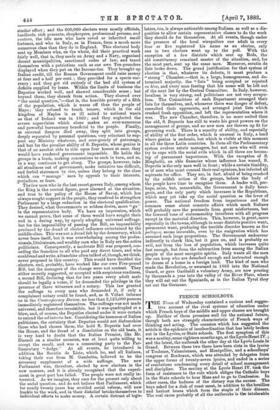ITALIAN POLITICS.
THE great experiment lately made by the Italian Govern- ment, the introduction of a low suffrage, together with scrutin de liste, has, we fear, failed, and the circumstances of the failure are worth attention. Italy, after she had been formed, started on the constitutional career with what may be called a Ten-pound franchise. The electoral right was not based, as in England, upon rental, but the payment of direct taxes to the amount of forty francs a year had an exactly similar effect ; and the 600,000 electors were mostly officials, landlords, rich peasants, shopkeepers, professional persons, and rentiers, the idle men who have saved or inherited small fortunes, and who in Italy, as in France, form a much more numerous class than they do in England. This electoral body sent up Members who, on the whole, did their practical work fairly well, that is, they made an Army and a Navy, organised • decent municipalities, sanctioned codes of law, and taxed themselves with a patriotism such as our own Ten-pounders displayed when they pat on the Income-tax. They brought up Italian credit, till the Roman Government could raise money at four and a half per cent. ; they provided for a specie cur- rency ; and they got rid entirely of the bad old system of deficits supplied by loans. Within the limits of business the Deputies worked well, and showed considerable sense ; but beyond them, they shrank from action. They slurred over "the social question,"—that is, the horrible poverty of a fifth of the population, which is worse off than the people of Mayo ; they refused to touch tenure, which in the old kingdom of Naples is as ill suited to national wants as that of Ireland was in 1869 ; and they neglected the severe supervision which alone makes an over-numerous and powerful bureaucracy beneficial to the people. Finally, as external dangers died away, they split into groups, deeply separated by personal questions, very reluctant to sup- port any Ministry whatever, and over-greedy of patronage, and but for the peculiar ability of S. Depretis, whose genius is that of an acrobat able to ride upon four horses at once, they would have rendered government impossible. He holds the groups in a leash, making concessions to each in turn, and so, in a way, continues to get along. The groups, however, take all steadiness out of government, make initiative too difficult, and forbid statesmen to rise, unless they belong to the class which can " manage " men by appeals to their interests, prejudices, or fears.
The few men who in the last resort govern Italy, among whom the King is the central figure, grew alarmed at the situation, and true to the policy of the House of Savoy, which has always sought support in the people, they resolved to strengthen Parliament by a large reduction in the electoral qualification.
They desired, what Governments so seldom desire, more " go " in the representative body. We have an impression, which we cannot prove, that some of them would have sought their end in a daring way, by openly adopting universal suffrage, but for the impossibility of passing the Bill, an impossibility produced by the dread of clerical influence entertained by the middle-class. This was not a dread felt by the democracy, which never fears itself, but it was overwhelming among the profes- sionals,litterateurs, and wealthy men who in Italy are the active politicians. Consequently, a moderate Bill was proposed, con- • ceding the franchise to all who paid any direct taxes, and who -could read and write, a franchise often talked of, though, we think, never proposed in this country. This would have doubled the - electors, and, probably, have worked like our own Five-pound Bill, but the managers of the change were not content. They either secretly suggested, or accepted with suspicious readiness, a second Bill, declaring that for two years every adult male should be legally a voter, if he demanded the privilege in the presence of three witnesses and a notary. This law granted the suffrage to every man who demanded it, if only a complaisant notary could be found, and, as S. Villari informs -us in the Contemporary Review, no less than 2,125,000 persons -immediately registered themselves. The suffrage was not made • universal, and therefore irresistible, but it was quadrupled at a blow, and, of course, the Deputies elected under it were certain to extend the ad interini law. Considering the keenness of Italian politicians, the certainty that Deputies would not disfranchise those who had chosen them, the hold S. Depretis had over the House, and the dread of a dissolution on the old basis, it is very hard to doubt that the Italian Premier, like ifr. Disraeli on a similar occasion, was at least quite willing to accept the result, and was a consenting party to the Par- liamentary "dodge." At all events, he introduced in addition the Scrutin de Lige, which he, and all Italians, taking their cue from M. Gambetta, believed to be the necessary supplement of a wide suffrage. The new Parliament was, therefore, elected by new electors in the new manner, and it is already recognised that the experi- ment in great part has failed. The people were not really in- terested. As we imagine, they care for the present only about the social question, and do not believe that Parliament, which for nearly twenty years has avoided social reform, will now buckle to the work, and in their disbelief betake themselves to individual efforts to make money. A certain distrust of legis- The real cause probably of all the outbreaks is the intolerable lators, too, is always noticeable among Italians, as well as a dis- position to allow certain representative classes to do the work they should do for themselves. At all events, though under the pressure of the local wirepullers one adult in every four or five registered his name as an elector, only one in two electors went up to the poll. With the exception of a few districts which sent up Reds, the old constituency remained master of the situation, and, for the most part, sent up the same men. Moreover, scrutin de liste broke down. The grand justification for that system of election is that, whatever its defects, it must produce a "strong " Chamber,—that is, a large, homogeneous, and de- termined majority, the " lists" being accepted or rejected en bloc, and every man fearing that his name will be left out of the next list by the Central Committee. In Italy, however, localism is very strong, and politicians are not very scrupu- lous. The Committees of each Department arranged their lists for themselves, and, whenever there was danger of defeat, consulted their opponents, and arranged joint lists which crushed fresh opposition, and left the representation where it was. The new Chamber, therefore, is no more united than the old, S. Depretis has still to waste his great powers on the management of groups, and no new men are thrown up fit for governing work. There is a scarcity of ability, and especially of ability of the first order, which is unusual in Italy, a land where genius is endemic, but which is visible at this moment in all the three Latin countries. In them all the Parliamentary system evolves astute managers, but not men who will even try to cope with the social evils which in all three are becom- ing of paramount importance. With the exception of S. Minghetti, an able financier whose influence has waned, S. Depretis is the only man well in front ; while a certain timidity, as of men who must conceal their real opinions, has infected all aspirants for office. They are, in fact, afraid of being crushed by the selfish action of the groups, before the body of the people have time to recognise them. A leader will, per- haps, arise, but, meanwhile, the Government is dully bour- geois, and the only party which increases is the Republican, which may yet take up the social question as the lever of power. The national freedom from impatience and the common sense about concrete affairs which mark Italians will probably save the peninsula from great misfortunes, but the lowered tone of statesmanship interferes with all progress except in the material direction. This, however, is great, more especially in the towns, although in some districts positive want, permanent want, producing the terrible disorder known as the pellagra, seems incurable, even by the emigration which has assumed such large proportions. The Government endeavour indirectly to check this, but it goes on, and is probably an evil, not from the loss of population, which increases quite fast enough, but from the subtraction from among the Italian people of the most energetic spirits. Italy wants all the men she can keep who are detached enough and instructed enough to dream of a home in a foreign land. The kind of men who made the Revolution, or swarmed in 1866 into the National Guard, or gave Garibaldi a voluntary Army, are now pouring by thousands a year into the valley of the River Plate, where they will eat out the Spaniards, as in the Italian Tyrol they eat out the Germans.



































 Previous page
Previous page